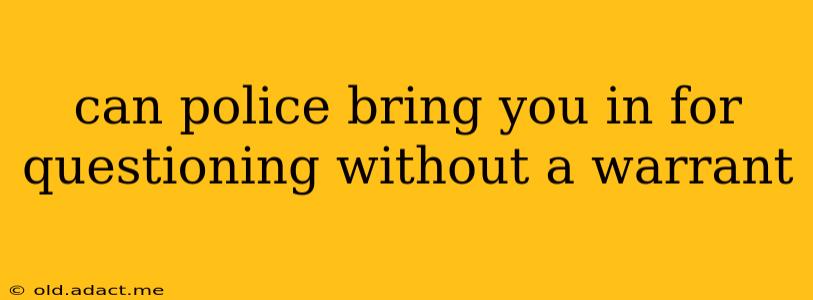Can Police Bring You In for Questioning Without a Warrant?
The question of whether police can bring you in for questioning without a warrant is complex and depends heavily on the circumstances. The short answer is: generally, no, not for custodial interrogation. However, there are significant exceptions and nuances to this rule. Understanding these exceptions is crucial for protecting your rights.
This article will explore the legal framework surrounding police questioning, address common concerns, and clarify the situations where a warrant might not be required.
What Constitutes "Custodial Interrogation"?
Before we delve into the exceptions, it's crucial to define "custodial interrogation." This refers to a situation where:
-
Custody: You are not free to leave. This doesn't necessarily mean handcuffs, but rather whether a reasonable person in your position would feel free to leave. Factors considered include the location (police station vs. street), the officer's demeanor, and the use of any physical restraints.
-
Interrogation: The police are engaging in questioning that is likely to elicit an incriminating response. This isn't limited to direct questioning; it can include indirect questioning, leading statements, or even psychological tactics designed to get you to confess.
If both custody and interrogation are present, you have the right to remain silent and the right to an attorney. These rights are guaranteed by the Fifth Amendment (protection against self-incrimination) and the Sixth Amendment (right to counsel) of the US Constitution.
When Can Police Bring You In for Questioning Without a Warrant?
There are several situations where police might bring you in for questioning without a warrant, even if it could be considered custodial interrogation:
1. Probable Cause for Arrest: If police have probable cause to believe you have committed a crime, they can arrest you and bring you in for questioning without a warrant. Probable cause is a reasonable belief, based on facts and circumstances, that a crime has been committed and that you committed it. This is a high standard, requiring more than mere suspicion.
2. Consent: If you voluntarily agree to go to the police station for questioning, you have waived your right to be free from custodial interrogation without a warrant. However, this consent must be freely and intelligently given. Coercion or intimidation would invalidate the consent.
3. Exigent Circumstances: In emergency situations, police may act without a warrant. This could include situations where evidence is being destroyed, a crime is in progress, or there is an immediate threat to public safety. The exigent circumstances must be genuinely urgent and directly related to the reason for the questioning.
4. Stop and Frisk (Terry Stop): Police can briefly detain you for a "Terry Stop" based on reasonable suspicion, a lower standard than probable cause. During a Terry Stop, they can conduct a pat-down for weapons. While questioning is allowed, the scope is limited, and the detention must be brief. If they develop probable cause during the stop, they can then arrest you.
5. Public Places: Police may question you in a public place without a warrant, but you are generally free to leave unless they have reasonable suspicion to detain you.
What Should You Do If Police Want to Question You?
Regardless of the circumstances, know your rights:
- You have the right to remain silent. Anything you say can and will be used against you in court.
- You have the right to an attorney. If you are arrested or believe you are in custody, ask for a lawyer immediately. The police must honor this request.
- Document everything. If possible, write down the date, time, location, names of officers involved, and the substance of the conversation.
Remember: This information is for educational purposes only and should not be considered legal advice. If you are facing legal trouble, consult with a qualified attorney immediately. They can provide accurate and tailored advice based on your specific circumstances.
